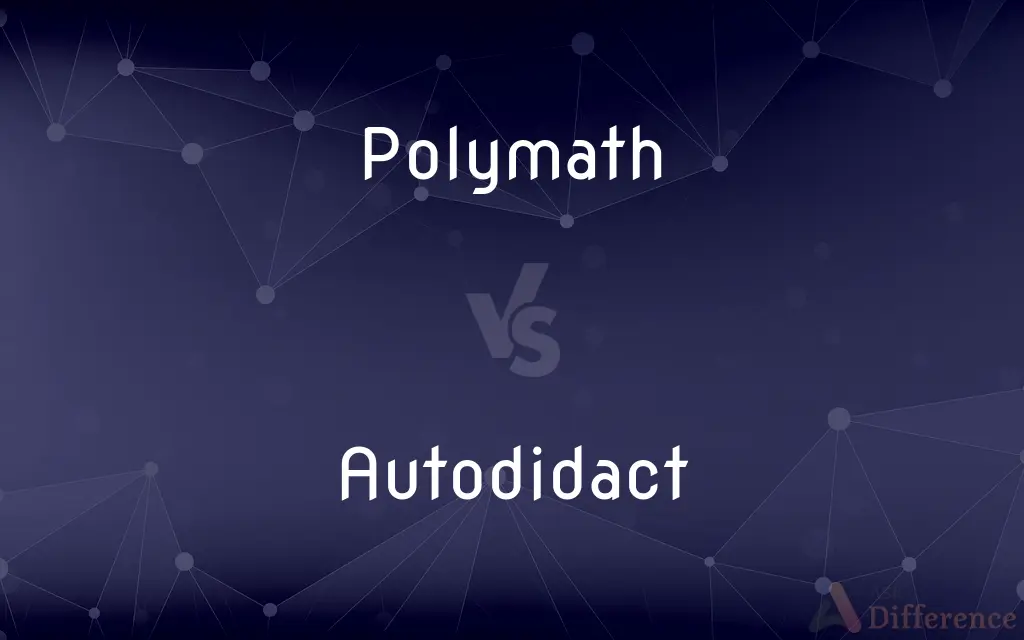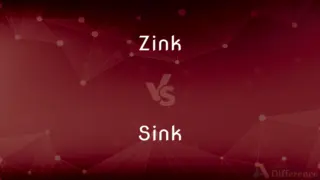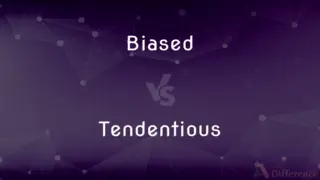Polymath vs. Autodidact — What's the Difference?
By Fiza Rafique & Maham Liaqat — Updated on April 23, 2024
A polymath is skilled in multiple subjects, often integrating knowledge, whereas an autodidact is self-taught, focusing on learning without formal education.

Difference Between Polymath and Autodidact
Table of Contents
ADVERTISEMENT
Key Differences
A polymath excels across diverse fields of study, showing breadth in knowledge and often contributing significantly to multiple disciplines, while an autodidact focuses on acquiring knowledge independently, often in specific areas of personal interest.
Polymaths are known for their ability to make interdisciplinary connections, enhancing innovations and problem-solving, whereas autodidacts might excel in particular niches, driven by personal curiosity rather than a structured curriculum.
Historical figures like Leonardo da Vinci exemplify polymathy with achievements in art, science, and engineering, on the other hand, largely self-taught individuals like Malcolm X used self-education to become influential in specific spheres.
While polymaths often receive formal education that helps them explore various fields, autodidacts typically pursue learning in a self-directed manner, sometimes out of necessity or a lack of access to formal education.
Polymaths might be celebrated for their wide-ranging expertise and versatility across subjects, whereas autodidacts are often admired for their dedication and ability to master complex subjects on their own.
ADVERTISEMENT
Comparison Chart
Definition
An individual with knowledge and expertise in multiple disciplines.
An individual who self-educates, learning independently of formal schooling.
Education
Often formally educated in multiple areas.
Primarily self-taught, may not have formal education in the fields they know.
Learning Approach
Integrative and interdisciplinary, seeking connections between fields.
Focused and individualistic, driven by personal interests or needs.
Examples
Leonardo da Vinci, Galileo Galilei.
Malcolm X, Frida Kahlo.
Key Traits
Versatility, broad interest, and capability in multiple areas.
Self-motivation, persistence, and deep focus in specific areas.
Compare with Definitions
Polymath
Someone skilled in multiple disciplines.
The architect, also a skilled painter and writer, was a true polymath.
Autodidact
A self-directed learner.
The artist, an autodidact, developed her unique style without formal training.
Polymath
A versatile scholar or artist.
As a polymath, her contributions spanned from engineering to music.
Autodidact
A person who teaches themselves through books, online courses, or experimentation.
She learned organic farming through autodidactic methods.
Polymath
A person with wide-ranging knowledge across several domains.
She is considered a polymath due to her expertise in mathematics, literature, and philosophy.
Autodidact
A self-taught person who learns outside of traditional educational systems.
He became an expert in languages as an autodidact.
Polymath
An individual proficient in varied subjects.
His polymath abilities allowed him to contribute to both arts and sciences.
Autodidact
Someone who educates themselves.
As an autodidact, she mastered several programming languages.
Polymath
A person of encyclopedic learning.
The professor was known as a polymath for his extensive knowledge in numerous subjects.
Autodidact
An individual who pursues knowledge independently.
His extensive library was a testament to his life as an autodidact.
Polymath
A polymath (Greek: πολυμαθής, polymathēs, "having learned much"; Latin: homo universalis, "universal person") is an individual whose knowledge spans a substantial number of subjects, known to draw on complex bodies of knowledge to solve specific problems. In Western Europe, the first work to use the term polymathy in its title (De Polymathia tractatio: integri operis de studiis veterum) was published in 1603 by Johann von Wowern, a Hamburg philosopher.
Autodidact
A self-taught person.
Polymath
A person of wide knowledge or learning
A Renaissance polymath
Autodidact
A self-taught person.
Polymath
A person of great or varied learning.
Autodidact
A self-taught person.
Leonardo Da Vinci is one of the greatest autodidacts.
Polymath
A person with extraordinarily broad and comprehensive knowledge.
Autodidact
One who is self-taught; an automath.
Polymath
A person of great and varied learning
Autodidact
A person who is self-taught
Common Curiosities
What are common traits of a polymath?
Common traits include curiosity, a passion for learning, and the ability to integrate knowledge from various fields.
What is a polymath?
A polymath is someone who possesses a deep level of knowledge and skill in multiple academic fields.
What drives an autodidact to learn?
Autodidacts are often driven by personal interest, curiosity, and the necessity or desire to acquire new skills without formal schooling.
Can a polymath also be an autodidact?
Yes, a polymath can also be an autodidact if they acquire their knowledge in multiple disciplines through self-study.
How do autodidacts find resources for learning?
Autodidacts utilize books, online resources, community workshops, and other available materials to educate themselves.
What motivates a polymath to study multiple fields?
A natural curiosity, a desire for comprehensive understanding, and often an intrinsic motivation to explore and connect different areas of knowledge.
What does it mean to be an autodidact?
Being an autodidact refers to the process of teaching oneself about a subject or subjects in which one has had little to no formal education.
How do polymaths contribute to society?
Polymaths often contribute to innovations and problem-solving by making connections across different disciplines.
What are the challenges faced by autodidacts?
Autodidacts may face challenges such as lack of access to formal training, guidance, and recognition in professional fields.
Can autodidacts achieve professional success?
Many autodidacts achieve professional success, especially in fields that value skill and knowledge over formal education credentials.
Are there any famous historical polymaths?
Yes, notable historical polymaths include Leonardo da Vinci and Benjamin Franklin.
What kind of recognition do autodidacts receive for their knowledge?
While formal recognition can be limited, autodidacts often gain recognition through the quality of their work and contributions to their fields.
Do polymaths typically have careers in academics?
Many polymaths find themselves in academic or research-oriented careers where they can utilize and expand their broad knowledge base.
Is being an autodidact more challenging than traditional education paths?
Being an autodidact can be more challenging due to the lack of structured learning and formal guidance, but it also offers greater flexibility and personalization of education.
What impact do polymaths have on interdisciplinary studies?
Polymaths play a crucial role in interdisciplinary studies by blending insights and methodologies from various disciplines.
Share Your Discovery

Previous Comparison
Zink vs. Sink
Next Comparison
Biased vs. TendentiousAuthor Spotlight
Written by
Fiza RafiqueFiza Rafique is a skilled content writer at AskDifference.com, where she meticulously refines and enhances written pieces. Drawing from her vast editorial expertise, Fiza ensures clarity, accuracy, and precision in every article. Passionate about language, she continually seeks to elevate the quality of content for readers worldwide.
Co-written by
Maham Liaqat















































